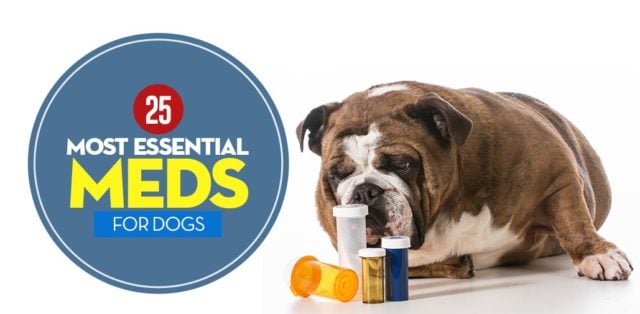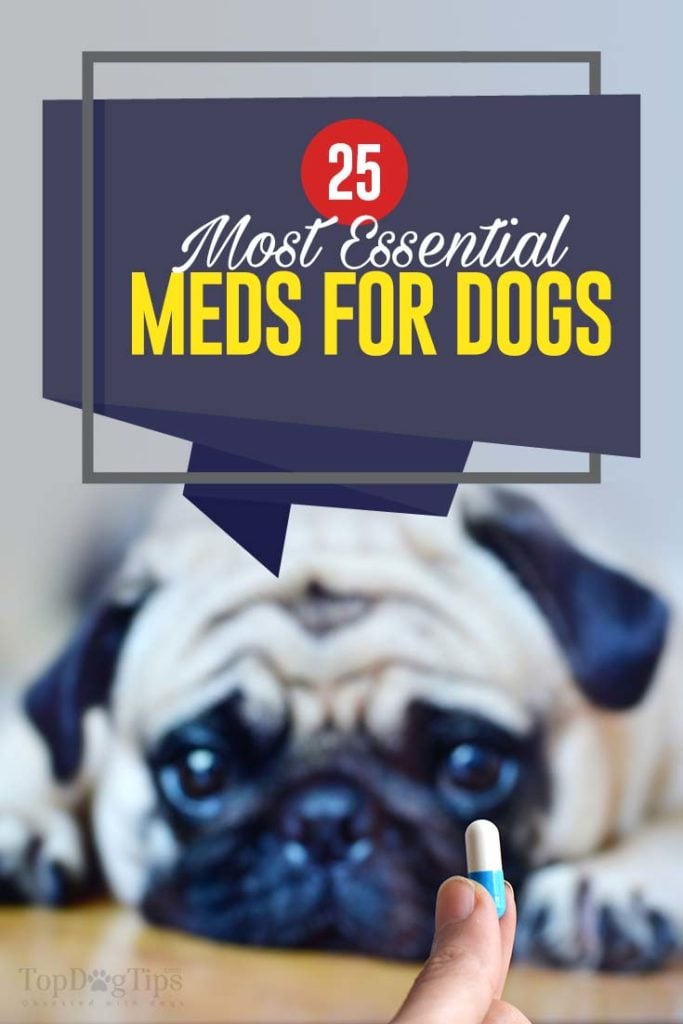
Table of Contents
- 25 Most Essential Dog Meds
(And When You Need Them)
- 1. Heartworm Preventative
- 2. Rabies Vaccinations
- 3. Flea Preventative
- 4. Tick Preventative
- 5. NSAID’s
- 6. Antibiotics
- 7. Other Pain Management Drugs
- 8. Seizure Control Medication
- 9. Wormers
- 10. Ear Wash
- 11. Insulin
- 12. ACE Inhibitors
- 13. Beta-Blockers
- 14. Antiprotozoal
- 15. Anti-Diarrhea
- 16. Disinfectant / Antiseptic
- 17. Steroids
- 18. Antihistamines
- 19. Anti-Anxiety Medications
- 20. Joint Support
- 21. Incontinence Medications
- 22. Levothyroxine
- 23. Diuretics
- 24. Selegiline HCL
- 25. Calcium Level Regulator
As pet parents, it’s our responsibility to give our dogs the best medical care possible. To do this, it’s important to be familiar with some of the most essential dog meds. Let’s take a look at 25 of these in no particular order, and I'll explain why they are so beneficial for our canine companions.
Just keep in mind that you should never put your pet on medication without consulting with your veterinarian first. Whether you are considering administering an over-the-counter medication or seeking prescriptions for your pup, it’s crucial to communicate fully with your vet.
Over-the-counter medications require specific dosing to be safe and can interfere with other medications and health conditions. Prescription medications require a current prescription from your vet and should not be purchased from questionable online retailers.
RELATED: How to Safely Buy Cheap Pet Meds (and save money)
25 Most Essential Dog Meds
(And When You Need Them)
1. Heartworm Preventative
- Examples: Heartgard, Trifexis, Sentinel, Interceptor Plus
- Used to Treat: Prevention of heartworm infestation or slow-kill treatment for existing heartworm infections.
Why It’s Beneficial: Dogs can contract heartworm disease through the bite of an infected mosquito. Without dog meds to kill heartworm before they mature, heartworm will lodge in the lungs, heart, and blood vessels and begin to reproduce. As the infection worsens, organ damage begins and can eventually cause death.
2. Rabies Vaccinations
- Examples: Nobivac and Rabvac
- Used to Treat: Prevention of rabies
Why It’s Beneficial: Rabies can be contracted through the bite, saliva, fresh wound, or mucous membranes of an infected animal. Rabies is a deadly disease that can affect many animals, including you and your dog. In the United States, it is illegal not to vaccinate your dog against rabies since the disease poses a public threat. Failure to maintain regular rabies vaccinations for your dog is punishable by a fine as well as jail time.
3. Flea Preventative
- Examples: K9 Advantix, Frontline, Fiproguard, Advantage II
- Used to Treat: Prevention of flea infestation
Why It’s Beneficial: Flea preventatives work by killing fleas once they ingest the product on your dog or inhibit the growth and egg development of fleas after exposure to the product. Without preventative treatment, fleas can give your dog tapeworms, anemia, Bartonella, Murine Typhus, and Mycoplasma haemofelis.
Reviews: The Best Flea Drops
4. Tick Preventative
- Examples: K9 Advantix, Frontline, Fiproguard, Pet Armor
- Used to Treat: Prevention of tick-borne disease by causing ticks to fall off your dog
Why It’s Beneficial: Ticks carry a variety of potentially deadly diseases that can be passed to your dog through a single bite. Without regular tick preventatives, your dog may contract Lyme disease, anaplasmosis, ehrlichiosis, Rocky Mountain spotted fever, and American Canine Hepatozoonosis.
Reviews: The Best Tick Preventative
5. NSAID’s
- Examples: Carprofen (Novox or Rimadyl), Deracoxib, Firocoxib (Previcox), Meloxicam
- Used to Treat: Pain, fever, and inflammation
Why it’s Beneficial: Just as NSAID’s work to reduce inflammation and consequently pain in humans, they do the same for dogs. Without NSAID treatment your dog may experience pain, inhibited movement, depression and muscle wasting due to immobility.
6. Antibiotics
- Examples: Enrofloxacin (Baytril), Amoxicillin/Clavulanic acid (Clavamox), and Clindamycin (Antirobe)
- Used to Treat: Bacterial infections (Streptococcal infection, E-Coli, Bordetella, Helicobacter)
Why It’s Beneficial: Different types of bacterial infections respond differently to different types of antibiotics. It’s important to target bacteria with the correct type of antibiotic to eliminate it. Without treatment, bacterial infections can get worse and result in organ damage or loss, systemic infection, or even death.
7. Other Pain Management Drugs
- Examples: Opiates (Morphine, Codeine, Buprenorphine), Steroids (decrease pain by decreasing inflammation), and Antidepressants (Elavil and Tofranil)
- Used to Treat: Pain
Why It’s Beneficial: Dogs, like humans, experience pain for many reasons – after surgery, due to arthritis, after an accident, etc. It’s equally important to manage a dog’s pain as it is your own. The strength and type of pain management needed will depend on the cause of your dog’s pain and any ongoing illness. Untreated pain is inhumane and can lead to snapping, biting, or other behavioral changes.
Reviews: The Best Dog Fail Relief Aids
8. Seizure Control Medication
- Examples: Phenobarbital and Potassium bromide
- Used to Treat: Seizures or epilepsy
Why It’s Beneficial: Dogs with seizure disorders that are left untreated have a tendency to experience a gradual increase in seizure frequency and severity. Ongoing uncontrolled seizures can lead to brain damage and even death, which is why these dog meds are so essential.
9. Wormers
- Examples: Drontal Plus, Panacur, Heartgard, Sentinel, and Trifexis
- Used to Treat: Various types of worms, including large roundworms, hookworms, tapeworms, and whipworms
Why It’s Beneficial: There are various types of worms that can take up residence in your dog’s body. Many of these parasites contribute to diarrhea, weight loss, malnutrition, vomiting, and even gastrointestinal bleeding. If left untreated, dogs can succumb to severe worm infestations. Young puppies, elderly dogs, and dogs with suppressed immune systems are particularly susceptible to rapid deterioration due to worm infestation.
Reviews: The Best Dog DeWormer Review
10. Ear Wash
- Examples: Virbac Epi-Otic
- Used to Treat: Ear infections and for preventative care of the ears
Why It’s Beneficial: Dogs with certain types of ears (droopy or pendulous) frequently suffer ear infections. These infections are due to moisture and heat getting trapped in the ears and breeding yeast or bacteria. Ear washes like Virbac Epi-Otic cleanses and dry out the ear canal to clear up existing and prevent future ear infections. Untreated ear infections can lead to perforation of the eardrum and deafness.
Reviews: The Best Dog Ear Infection Treatments
11. Insulin
- Examples: Vetsulin
- Used to Treat: Diabetes
Why It’s Beneficial: As with diabetic humans, uncontrolled diabetes in dogs can result in blindness, weight loss, increased thirst, high glucose levels, and deadly ketoacidosis; insulin is produced naturally by the body and controls blood sugar levels. Diabetic dogs do not produce sufficient insulin, causing blood sugar levels to fluctuate. Vetsulin is an injectable drug that works as a synthetic form of insulin.
12. ACE Inhibitors
- Examples: Enalapril (Enacard, Vasotec), Benazepril (Lotensin), Lisinopril (Prinivil, Zestril)
- Used to Treat: Heart failure, high blood pressure, and occasionally kidney failure
Why it’s Beneficial: ACE inhibitors or Angiotensin-Converting Enzyme inhibitors work to prevent narrowing of the blood vessels that results in higher blood pressure. Lowering the blood pressure this way makes it easier for the heart to function.
13. Beta-Blockers
- Examples: Propranolol (Inderal®, Intensol®), Atenolol and Metoprolol
- Used to Treat: Beta-blockers are used in the treatment of heart failure and heart arrhythmias, and for regulating blood pressure
Why It’s Beneficial: Beta-blockers are beneficial to dogs with heart failure because they slow the heart rate to allow more blood to fill the heart and increase the amount of blood ejected with each contraction.
Without beta-blockers to regulate the heart rhythm, dogs with arrhythmia can faint, experience congestive heart failure, suffer from reduced blood flow to vital organs, and even die. Beta-blockers are helpful for high blood pressure because they slow the heart rate and require less force to pump blood from the heart, decreasing blood pressure.
14. Antiprotozoal
- Examples: Metronidazole (Flagyl®) and Sulfadimethoxine (Albon®)
- Used to Treat: Protozoal infections like Giardia and Coccidia
Why It’s Beneficial: Protozoal infections generally cause significant gastrointestinal upset and diarrhea. If the protozoa are left untreated, it can lead to bloody diarrhea, dehydration, weakness, and lethargy. These infections are particularly dangerous to young puppies who have not yet acquired immunity against coccidiosis, as well as elderly or immune-compromised dogs.
15. Anti-Diarrhea
- Examples: Loperamide (Immodium), Isopropamide, Bismuth sub-salicylate, Kaolin-pectin, Propantheline and Diphenoxylate
- Used to Treat: Diarrhea
Why It’s Beneficial: Ongoing diarrhea can cause dehydration, weakness, and electrolyte imbalance. These side effects are particularly dangerous for young dogs, elderly dogs, and dogs with existing health conditions or compromised immune systems.
Reviews: The Best Diarrhea Aids
16. Disinfectant / Antiseptic
- Examples: Chlorhexidine, Povidone-iodine
- Used to Treat: Scrapes, minor wounds, cuts, and used to sterilize areas of skin
Why it’s Beneficial: You may not think of these as dog meds, but they are used to prevent bacterial infection of wounds or surgical cuts, it’s important to disinfect the area thoroughly. While some people recommend hydrogen peroxide for this, it is too caustic and can damage tissue, so Chlorhexidine and iodine are preferred. Without being disinfected, bacteria can be introduced to a sterile site or take hold of existing wounds and result in complications.
Reviews: The Best Dog Skin Infection Treatments
17. Steroids
- Examples: Prednisone, Prednisolone, Dexamethasone, and Triamcinolone
- Used to Treat: For the treatment of pain, inflammation, allergic reactions, and autoimmune disorders
Why It’s Beneficial: Steroids work by suppressing the immune system. This slows down or stops any allergic reaction, inflammation, and pain related to inflammation. These dog meds can be dangerous since they suppress the immune system, but when the immune system is overactive, this is necessary.
18. Antihistamines
- Examples: Benadryl (diphenhydramine), Atarax/Vistaryl (hydroxyzine), Chlortrimeton (chlorpheniramine), Tavist (clemastine), Periactin (cyproheptadine), Temaril (trimeprazine)
- Used to Treat: Allergic reactions
Why It’s Beneficial: Allergic reactions range from unpleasant to life-threatening and include itching, swelling, and trouble breathing. Without treatment with antihistamines, these symptoms can worsen and lessen quality of life. Taking special precautions with allergy meds for dogs is usually necessary, as is a consultation with a vet.
Note: For serious and life-threatening allergic reactions, antihistamines are ineffective, and epinephrine is generally administered instead.
19. Anti-Anxiety Medications
- Examples: Alprazolam, Amitriptyline, Buspirone, Clomipramine, Lorazepam
- Used to Treat: Anxiety
Why It’s Beneficial: Dogs with anxiety often develop destructive behaviors, exhibit self-mutilating behaviors, are depressed, and may snap or bite. Dog medication for anxiety can reduce these types of symptoms or eliminate them completely and give your dog a better quality of life.
Reviews: The Best Anxiety Aids
20. Joint Support
- Examples: Glucosamine, MSM, Chondroitin
- Used to Treat: To maintain healthy joints and treat symptoms of arthritis and joint stiffness
Why It’s Beneficial: Like humans, dogs can develop arthritis and sore joints; this is particularly common in larger breed dogs. Joint support supplements can help to maintain existing joint health and ease the movement of arthritic joints by lubrication.
Reviews: The Best Joint Support
21. Incontinence Medications
- Examples: Proin
- Used to Treat: Incontinence
Why it’s Beneficial: Incontinence dog meds work to tighten the sphincter muscle on the bladder to help to control leaking of urine. Without dog meds, incontinence is unpleasant as well as unhealthy for you and your dog.
22. Levothyroxine
- Examples: Thyro-Tabs, Soloxine, and Levocrine
- Used to Treat: Hypothyroidism
Why It’s Beneficial: When the thyroid is under-functioning, it is unable to produce necessary hormones that control heart rate, body temperature, and metabolism. Without supplementation with synthetic thyroid hormone, hypothyroidism can result in fatigue, weight gain, dry skin, and constipation.
23. Diuretics
- Examples: Furosemide, HCTZ, Spironolactone.
- Used to Treat: Fluid buildup, congestive heart failure, pulmonary edema, kidney disease, and tissue swelling.
Why It’s Beneficial: A buildup of fluid in any area of the body results in impaired organ functioning, added stress on the skin, and trouble breathing, among other things. Without treatment with dog meds to prompt increased fluid output, fluid buildup can even cause death.
24. Selegiline HCL
- Examples: Anipryl
- Used to Treat: Canine cognitive dysfunction and some types of Cushing’s disease
Why It’s Beneficial: Dogs with canine cognitive dysfunction experience symptoms common to Alzheimer’s and senility in humans. These dogs exhibit a significant decline in their quality of life, and without treatment, they are unhappy. Dogs with untreated Cushing’s disease can develop life-threatening conditions such as kidney failure, liver failure, heart failure, and chronic infections.
25. Calcium Level Regulator
- Examples: Calcitriol
- Used to Treat: Hypoparathyroidism and Kidney disease.
Why it’s Beneficial: Calcitriol regulates levels of calcium in the blood by increasing absorption of calcium in the intestines. This is beneficial for dogs with low calcium levels that result from hypoparathyroidism.
Calcitriol is the last of the dog meds I'd like to mention, but pet owners are less familiar with it. It's also beneficial for reducing the concentration of parathyroid hormones in dogs that have chronic kidney disease. This is beneficial because dogs with kidney disease experience abnormally high levels of parathyroid hormone.
Want to share this?














